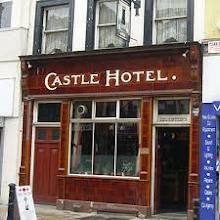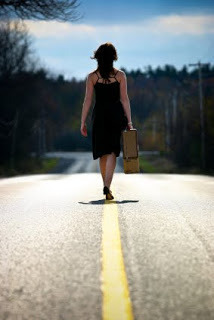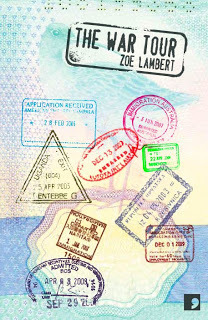Zoe Lambert's Blog, page 2
February 5, 2012
How to Save a Library and Lise Meitner goes to Maghull
For National Libraries Day I read at Meadows Library in Maghull, Sefton. With the closures and threats of closures, Meadows seems to have taken a novel approach - unless more libraries are doing this? - they are based in a leisure complex. The building is open plan and on the left is a swimming pool and on the right is the library. You can see people swimming while looking at the books. It's not a quiet library. There's a TV screen playing a music channel and from somewhere I could hear the pump and beat of an aerobics class. But the library was a community and social space, and not cut off.The librarian said that the library and the leisure centre supported each other. But they had been hit by other cuts. There had been a drop in children coming to the library since free swimming had been stopped.
As a child I loved libraries. So did my mother. We were members of quite a few: Eccles Library, Hope Library, Height Library, occasionally Swinton library. Going to the library was a family day out. My mother was - is a big reader. But we don't go much anymore because she is dependent on others taking her, and others, like me, aren't always reliable. So we tend to buy books in bulk from Waterstones.
This reading was a family day out as my folks chauffered me there. I'd checked the library was accessible (I get really angry about places not being accessible). What I liked about this event was that it wasn't in a secluded room at the back of the building, but in the middle of the library space on the first floor. The doors were closed so we weren't disturbed by people going to the gym, but we weren't hidden away either.
I was worried about reading 'Crystal Night'. I wasn't sure whether the audience was expecting a story about the discovery of nuclear fission, and I didn't want to blind them with science, but they seemed to really enjoy it; there was a lively discussion, which continued after the event had finished. I told them that when I wrote the story I had had a moment of feeling I understood the experiments, but now I'd forgotten what the hell it all meant. The science and explanations in the story had been down to James Sumner's excellent input and Ra Page's equally excellent editorial help. But what I had also been interested in was Lise Meitner's experiences fleeing Germany in 1938. Her story resonated with other stories I was writing in The War Tour about refugees and the effects of war. She was, of course, very fortunate to be whisked out of Berlin by Neils Bohr and Dirk Coster, but she was a woman who had overcome the barriers of gender to become one of the few renowned female scientists at the time, and then had her position at the Kaiser Wilhelm Institute for Chemistry taken from her. What also fascinated me was how she was at once sidelined by history (alone in Stockholm and pushed outside of the discovery of fission) and also absolutely central to world events.
When I was writing the story I thought of giving a bigger picture of her life and perhaps including what happened afterards - Hiroshima and Nagosaki and Otto Hahn being awarded the Nobel. But I wanted to stay in that moment in history - the beginning of 1939 when WWII was yet to begin and she wasn't aware of the devastating possibilities of nuclear fission, and though I hope I didn't reduce the story to a clichéd eureka, for Lise Meitner there was a moment when these were 'beautiful results'(to quote one of her letters).
As a child I loved libraries. So did my mother. We were members of quite a few: Eccles Library, Hope Library, Height Library, occasionally Swinton library. Going to the library was a family day out. My mother was - is a big reader. But we don't go much anymore because she is dependent on others taking her, and others, like me, aren't always reliable. So we tend to buy books in bulk from Waterstones.
This reading was a family day out as my folks chauffered me there. I'd checked the library was accessible (I get really angry about places not being accessible). What I liked about this event was that it wasn't in a secluded room at the back of the building, but in the middle of the library space on the first floor. The doors were closed so we weren't disturbed by people going to the gym, but we weren't hidden away either.
I was worried about reading 'Crystal Night'. I wasn't sure whether the audience was expecting a story about the discovery of nuclear fission, and I didn't want to blind them with science, but they seemed to really enjoy it; there was a lively discussion, which continued after the event had finished. I told them that when I wrote the story I had had a moment of feeling I understood the experiments, but now I'd forgotten what the hell it all meant. The science and explanations in the story had been down to James Sumner's excellent input and Ra Page's equally excellent editorial help. But what I had also been interested in was Lise Meitner's experiences fleeing Germany in 1938. Her story resonated with other stories I was writing in The War Tour about refugees and the effects of war. She was, of course, very fortunate to be whisked out of Berlin by Neils Bohr and Dirk Coster, but she was a woman who had overcome the barriers of gender to become one of the few renowned female scientists at the time, and then had her position at the Kaiser Wilhelm Institute for Chemistry taken from her. What also fascinated me was how she was at once sidelined by history (alone in Stockholm and pushed outside of the discovery of fission) and also absolutely central to world events.
When I was writing the story I thought of giving a bigger picture of her life and perhaps including what happened afterards - Hiroshima and Nagosaki and Otto Hahn being awarded the Nobel. But I wanted to stay in that moment in history - the beginning of 1939 when WWII was yet to begin and she wasn't aware of the devastating possibilities of nuclear fission, and though I hope I didn't reduce the story to a clichéd eureka, for Lise Meitner there was a moment when these were 'beautiful results'(to quote one of her letters).
Published on February 05, 2012 08:20
December 21, 2011
Best Short Stories I have read this year
The sun has finally risen on the shortest day of the year. A really bad metaphor has just popped into my head, along the lines of short stories being like short glimpses of light... anyway... It is also National Short Story Day. So to celebrate this here are some of the best short stories I have read or re-read this year.
- 'How to talk to your mother (notes)' Lyrical and haunting depiction of a mother and daughter. I am a big fan of Lorrie Moore and re-read this after recommending it to a student.
- 'Up the mountain coming down slowly' Dave Eggers' excellent contribution to McSweeney's Mammoth Treasury of Thrilling Tales. Tourists going up Mount Kilimanjaro - how much will they sacrifice to get to the top?
-'Everything is Moving, Everything is Joined' and 'Morphogenesis' in Litmus. It's a brilliant anthology and hard to choose which stories in it I like the best. I could list them all.
'The House of Usher' by Edgar Allen Poe. I looked at some classic short stories with my MA group at Uni of Bolton. I love this story. The sumptuous language and how Poe cranks up the horror notch by notch. We also discussed the classics 'The Dead' so I took time to re-read Dubliners as a whole. I know it's a predictable classic, but its also unsurpassable. We compared this to Carver's 'Cathedral'. One of his more optimistic stories. Years ago it inspired me to write my Ellipsis 2 story, 'The Stop' (though the eventual story has very little in common).
-I recently went to a reading of Comma's Lemistry, an anthology celebrating the work of Stanislav Lem. I found out the Philip K Dick suspected Lem wasn't a person at all, but a committee dishing out Soviet propaganda. Loved Annie Clarkson's 'Toby', a futuristic story of adoption.
-When I'm not at Bolton, I'm dashing to Edge Hill University. My third year seminar and I all loved John Burnside's 'Slut's Hair' in The Best of British Short Stories. Another favourite was Claire Massey's 'Feather Girls'. I feel if I describe these stories I'll ruin them. So I won't.
-I have just read Tom Vowler's The Method and Other Stories. Loved the whole collection. Really liked his dark and disturbing stories about children's propensity for violence: 'Homecoming and 'The Little Man', as well as his satires of writers, 'The Method' and 'One Story'.
- 'How to talk to your mother (notes)' Lyrical and haunting depiction of a mother and daughter. I am a big fan of Lorrie Moore and re-read this after recommending it to a student.
- 'Up the mountain coming down slowly' Dave Eggers' excellent contribution to McSweeney's Mammoth Treasury of Thrilling Tales. Tourists going up Mount Kilimanjaro - how much will they sacrifice to get to the top?
-'Everything is Moving, Everything is Joined' and 'Morphogenesis' in Litmus. It's a brilliant anthology and hard to choose which stories in it I like the best. I could list them all.
'The House of Usher' by Edgar Allen Poe. I looked at some classic short stories with my MA group at Uni of Bolton. I love this story. The sumptuous language and how Poe cranks up the horror notch by notch. We also discussed the classics 'The Dead' so I took time to re-read Dubliners as a whole. I know it's a predictable classic, but its also unsurpassable. We compared this to Carver's 'Cathedral'. One of his more optimistic stories. Years ago it inspired me to write my Ellipsis 2 story, 'The Stop' (though the eventual story has very little in common).
-I recently went to a reading of Comma's Lemistry, an anthology celebrating the work of Stanislav Lem. I found out the Philip K Dick suspected Lem wasn't a person at all, but a committee dishing out Soviet propaganda. Loved Annie Clarkson's 'Toby', a futuristic story of adoption.
-When I'm not at Bolton, I'm dashing to Edge Hill University. My third year seminar and I all loved John Burnside's 'Slut's Hair' in The Best of British Short Stories. Another favourite was Claire Massey's 'Feather Girls'. I feel if I describe these stories I'll ruin them. So I won't.
-I have just read Tom Vowler's The Method and Other Stories. Loved the whole collection. Really liked his dark and disturbing stories about children's propensity for violence: 'Homecoming and 'The Little Man', as well as his satires of writers, 'The Method' and 'One Story'.
Published on December 21, 2011 03:08
December 6, 2011
A few little things I've done for my book

I felt a lot more relaxed talking to Heather Stott on BBC Radio Manchester a couple of weeks ago. We had a lovely chat in the brand new studios in Salford Quays. The interview is on my page here. Last week I was interviewed in The Big Issue North. This weekend, Litmus:Stories from Modern Science was chosen as quirky stocking filler in the Observer.
My launch part 2 is at The Castle on Oldham St at 7pm on Thursday 8th December. This will also be the Comma Press christmas party, so if you are in Manchester, please come down. I will be reading with Michelle Green and afterwards we will be mostly drinking and taking the party back to the Comma Press offices at Madlab on Edge St.
If you are in Macclesfield, I'll be reading with Maria Roberts at Picchu on 9th December, where I will be very hungover. But there will be amazing food at the event to keep me going. You can bring your own wine and tickets can be bought from here.
Published on December 06, 2011 01:34
December 4, 2011
When Your Book Leaves Home

When your book is published is it similar to when your child leaves home? You're left with mixed feelings. Not sure what to do with yourself. Off the book goes, out into the world in its brand new cover, without a backward glance. You are left to worry and fret about how your book will fare. Everybody says, you must be so excited, but mostly you're just scared. You think, did you bring the book up correctly? Is it strong enough to survive? You tell people what a great book it is. How proud you are. Sometimes you wish the book handn't left home. You want to care for it and edit it forever. Some parents kick their book out when they are too young; they abandon their book when it needs them most (to quote Claire Keegan). Others are that pushy kind of parent, who force their book to compete. As a book-parent, I have to say, I'm now feeling like a spare part, hoping my book will pop home so I can do its washing. I don't know what to do with myself. Perhaps evening classes? Try to enjoy my new-found freedom? But the only solution is to have another book, and hope this one calls me once in a while.
Published on December 04, 2011 01:22
November 3, 2011
The War Tour is finally, finally out and in book form. Ju...

The War Tour is finally, finally out and in book form. Just in time for the launch at the Manchester Literature Festival event on 15th October. I read with Michelle Green, and I'm eagerly awaiting her forthcoming collection from Comma next year. I coughed through most of the event, or tried not to, with cough suppressant and vocal zone on the table. The disastrously timed cough magically disappeared for the nine minutes Michelle and I spent on Women's Hour the previous day. An absolutely terrifying experience at the studios on Oxford Road - the guests' waiting room was not unlike a dentists. It was the first time I'd had to say why I'd written a book about war. The big why, when I have not experienced a war personally (and why this question misses the point) will be discussed here very soon.
I'm going to chat tomorrow (Friday 4th November) to Heather Stott on BBC Radio Manchester. I almost wish I still had the cough. It's good to have something to focus your nerves on.

Published on November 03, 2011 08:38
April 27, 2011
on not writing your blog
I'm not sure how other writers keep up a blog while trying to finish a book. It takes all my energy to just write the book, never mind write about writing it.But then I'm not sure how a lot of people manage to do a lot of things. Like opening beer bottles with a lighter. Or going through doors. Have problems with doors. Opening them, and then there's door etiquette. Who lets who go through. Always tricky. Anyway, back to writing about not writing. I'm in the final edits...well almost final edits, and I have an ace cover, which you could use to get through passport control. What you want in a book is usefulness, I say.
It was an absolute pleasure to read at the 'Between War and Wishful Thinking' event with Larissa Boehning at the Bluecoats a couple of weeks ago. You can read about it here, and some of the stuff we said here.
It was an absolute pleasure to read at the 'Between War and Wishful Thinking' event with Larissa Boehning at the Bluecoats a couple of weeks ago. You can read about it here, and some of the stuff we said here.
Published on April 27, 2011 10:30
December 3, 2010
All Things Short Story
Utterly delighted to hear the David Constantine has won the BBC National Short Story Prize, with his story 'Tea at The Midland'. A truly great writer, who has published two collections of stories with Comma Press. You can buy Under The Dam and The Shieling, as well as the anthology of the National Short Story Prize shortlist here.
There's lots of great things with short stories at the moments. We are building up to the shortest day in the year and National Short Story Day on 21st December, which is a UK wide celebration of the short story form. It includes the participation of a number of independent presses with live and online events on the 21st. See more about the day here. Reading in Manchester is Sarah Holman, Michelle Green and Dave Gaffney. Can't wait!
There's lots of great things with short stories at the moments. We are building up to the shortest day in the year and National Short Story Day on 21st December, which is a UK wide celebration of the short story form. It includes the participation of a number of independent presses with live and online events on the 21st. See more about the day here. Reading in Manchester is Sarah Holman, Michelle Green and Dave Gaffney. Can't wait!
Published on December 03, 2010 06:45



